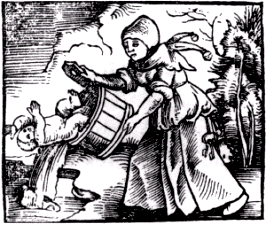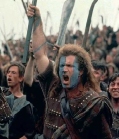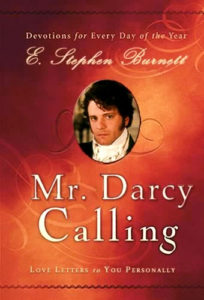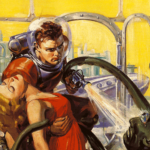Sex In The Story 3: Trans-Gender Issues
Feminism is disgusting. Ugly. We saw it most recently with that whole Susan Komen Foundation debacle, and we hear about it frequently — and will keep hearing about it, such as when, say, evangelical translators start messing with pronouns in the NIV.
 Really, we should expect feminism to get about in secular stories. Already in this series I’ve discussed one secular stereotype or negative icon: the whole “warrior princess” or shooting-up-heroine ideal. Yet unique to some evangelical “lore,” our teachings and our fiction, are at least two other feminine icons — not bad ones, altogether, but ones that should be combined, applying their Biblical ideas, and rejecting the wrong ones.
Really, we should expect feminism to get about in secular stories. Already in this series I’ve discussed one secular stereotype or negative icon: the whole “warrior princess” or shooting-up-heroine ideal. Yet unique to some evangelical “lore,” our teachings and our fiction, are at least two other feminine icons — not bad ones, altogether, but ones that should be combined, applying their Biblical ideas, and rejecting the wrong ones.
Do that in reality, and it will reflect in our stories. Do that in our fiction, and female characters will become stronger, better-rounded, more-realistic, and will glorify God.
So far, though, I’ve only talked about women. I’m thinking I’ll get to the negative icons and/or stereotypes about males, next week. I’m not sure, though, if I should be worried, because I’ve identified far more evangelical ideal sets for males than I have for females.
But first, a thought about the term icon, which here I’ve been using interchangeably with stereotype. Last week, Fred said he didn’t believe the term fit with my suggested examples. “They aren’t focused enough, and they seem more like stereotypes,” he wrote. Unlike icons, stereotypes distort truth, instead of summarizing it into a visual symbol that communicates truth, and which by itself is not harmful and can be positive, he said.
Fred and I have a series coming up soon about icons: the philosophy of them, Christian history with them, and their difference from characters. So it’s likely I learn more, then.
 At this point, though, I do think the word icon can describe these kinds of stereotypes, mainly because of how evangelicals treat a supposed human who embodies these traits. Of course icons, by themselves, are not evil. (I have a few on my desktop. Rim shot!) The Proverbs 31 Woman™, as mentioned last week, is certainly not evil, and the closely related Domestic Doyenne icon has some good traits. On the male side, aspiring to some values of say, William Wallace, would also not be evil — unless our sermons, books, and ministries talked about Wallace too often and said all men should imitate him. (A-hem.)
At this point, though, I do think the word icon can describe these kinds of stereotypes, mainly because of how evangelicals treat a supposed human who embodies these traits. Of course icons, by themselves, are not evil. (I have a few on my desktop. Rim shot!) The Proverbs 31 Woman™, as mentioned last week, is certainly not evil, and the closely related Domestic Doyenne icon has some good traits. On the male side, aspiring to some values of say, William Wallace, would also not be evil — unless our sermons, books, and ministries talked about Wallace too often and said all men should imitate him. (A-hem.)
Maybe we do need another term, something more personal and visual than the more-abstract-sounding term stereotype, a term that sounds more positive (though it isn’t), but which also doesn’t sully the idealism-connoting term icon.
My mental thesaurus is coming up short. So, I’ll be very creative and suggest caricature — a stylized picture of a specific person, or even general people group, that exaggerates many features. Caricatures are mainly for fun, or to make points, as in editorial cartoons or parody images of celebrities. But what happens when Christians take them seriously?
One result: caricature-icons of women, and men, infect our thinking. In our nonfiction or fiction, they settle in our minds and make us suspect anyone or anything that doesn’t conform to the caricature-icon. This can work for feminism, or its opposite: chauvinism.
Twisted features
Plenty of complaints have come up in this series about not one, but two sex-related evils of our age: feminism and chauvinism. I’ve been surprised and glad to see them equally railed against — not because I hold Spec-Faith readers in low regard, but because many well-meaning Christians seem stuck in the mindset of opposing only one at a time.
Which is the worst problem in the church: infecting feminism, or infecting chauvinism?
Answer: Both/and.
Yet if anyone, even subtly, presumes that Christians are only vulnerable to one error, they’ll overcorrect and end up buying into an equal-opposite caricature-icon.
1. ‘The Church is too feministic!’
Result in reality: Creeping chauvinism. We neglect Christ’s sacrifice for His Bride, the Church, and the Father’s nurturing care that is reflected in women who are created in His image. Among humans, we see women’s domain as only the home, and set men on higher spiritual pedestals. In the case of organized “Biblical patriarchy,” this leads even to viewing men as intercessor-priests of their houses, edging aside the only Mediator.
Result in fiction: Stories that treat women as silly and frivolous, while the men handle real spiritual struggles. I don’t see this in Christian novels, especially speculative stories, but if certain male-driven caricature-icons prevail (more on that later), it may happen.
2. ‘The Church is too chauvinistic!’
 Result in reality: Creeping feminism. We neglect the Bible’s references to God with masculine pronouns, Jesus’s God-Manhood, and the wrath, holiness, and justice that God does exhibit. On a human level, men don’t have a clue what they’re supposed to do, only what they’re not; just as with women under the “too-feministic” paradigm, men’s lives become only a long series of antis. They don’t lead in their families or churches.
Result in reality: Creeping feminism. We neglect the Bible’s references to God with masculine pronouns, Jesus’s God-Manhood, and the wrath, holiness, and justice that God does exhibit. On a human level, men don’t have a clue what they’re supposed to do, only what they’re not; just as with women under the “too-feministic” paradigm, men’s lives become only a long series of antis. They don’t lead in their families or churches.
Result in fiction: Stories that treat men as weak or irrelevant, while the women handle real spiritual struggles. I haven’t seen this in speculative novels, but it does seem more common in female-centric Christian fiction. (Queue arguments we’ve all already heard.)
Though I’m by no means immune to either of these extremes, I do wonder sometimes how come people feel a need to elevate one sex while devaluing the other.
Can we not have God-honoring real lives and superior stories when all are considered humans created in God’s image, different but equal?
Particularly in fiction, don’t readers often dislike stories in which other heroes are made weaker so the favored character stands out? Wouldn’t he be an even better character if equally strong characters, with diverse abilities, surrounded him, even followed him?
Maybe you’ve recently read a novel, Christian or otherwise, that seemed to echo some of these caricature-icons — either feministic or chauvinistic. With your own beliefs and background, how did that make you feel? How could that story have been improved? And how do you believe these improvements could aid readers, Christian or otherwise?









































Yes, males next week!
Hey Stephen–
I don’t know if I’m misreading what you’re saying here, but I don’t see how the TNIV is an example of feminism. If anything, the reaction against it appears to be either (charitably) a misunderstanding of semantic shift in language or (uncharitably) an inflexibility of thought or (really uncharitably) straight out sexism.
Pronouns referring to God or Jesus weren’t changed… it was the “generic male” pronoun, which historically has been used as an inclusive term for both genders, but has, over time, ceased to do that for everyone which were changed.
I don’t see a feminist ideal in play when “men” is replace by “people” when
people is what was meant.
Maybe it’s poor translation, or too early in the semantic shift to make the change, I think you could make an argument for that. To call it “ugly feminism” is going too far in my opinion. The translators are just trying to make sure that women are included when the language is inclusive. And the fact is that because of the shifts in English in some places, that not everyone picks up a Bible and reads “him” as synonymous with “him and/or her” or “them” or “man” as synonymous with “humanity.”
Okay, and now, a completely unrelated question. I read through the previous posts on this topic and saw the strong response against the warrior woman, the comic book warrior woman and so on as being unrealistic (“In real life, women would slow men down in battle” etc) and I don’t have an issue with that in real life. But I’m curious why it’s a big deal when we’re talking about (in the Avengers or comics in general) an entire Universe of such ridiculously exaggerated power differentials that it seems to me the women are being amped up less than the men, anyway. I mean, shouldn’t we also be saying “In real life, Tony Stark’s armor would be too heavy to fly” or “in real life Banner’s transformation into the Hulk would require an infusion of mass from somewhere” or “in real life Captain America’s shield would be silly”? Thor can walk onto a military base and — without a weapon — beat his way through the professional soldiers to get to his hammer, but we’re worried that Black Widow is unrealistic because women can’t fight as well as men? I don’t get it.
Having said that, I’d rather have the Scarlet Witch.
Er, what Matt said.
Hey Matt, thanks for your comment.
This would likely lead further afield, but speaking for myself, my dislike of some of the TNIV decisions were mainly based on this belief: that a good Biblical translation should communicate the Word as directly as possible, and leave the expositing to a pastor, or even side notes or commentaries.
I wish to acknowledge, by the way, that all pronouns for God in that translation were rightly kept male (I think there have been rumors to the contrary).
By the above I mean that if Scripture includes a pronoun that literally means brothers — the Greek word for brothers, adelphoi, as my ESV footnotes keep reminding me, can refer to brothers and sisters — then that is best translated literally. A text note, like the one in the ESV (and previous NIV too, I think), can help clarify. Or a pastor can draw out the meaning. But to put that over-translation in the actual translation of Scripture limits further exegesis, and can lead to confusion.
Furthermore, trying to “neuter” some traditionally male pronouns of Scripture as a well-meant, but possibly overdone “dynamic equivalent” effort may weaken the very truths the translators would want readers to find in the Bible. For example, the doctrine of adoption in Scripture is contingent on including the male references: adoption as sons, for example, in Romans 8:15. It’s vital to show, based on the culture of the day, that both men and women are now counted as adopted “sons” to God, legal heirs to His promises. From what I understand, the TNIV, contrary to its own policy, used the word sonship in that passage — even its translators decided not to get ahead of the game too much, and thereby “tame” the very Scripture that would have supported male/female equality before God!
Thoughts about superheroes and warrior princesses, below (though I think Kaci already hit on the points I would mention).
Well, if we’re gonna get picky, the ESV study notes can be a bit presumptuous sometimes.
Is it TNIV that does the genderless thing? I have no idea which.
The TNIV did do some gender-neutral language that many argued was unnecessary.
As for the ESV, I’m curious about which presumptuous study notes, so I can be aware. But of course, the ESV is the only allowable translation now, you must understand. Re-JECT Sayyy-taaans Biiii-bles for the AV 2001, brothahs and sistahs!
“…includes a pronoun that literally means
Hey Stephen, thanks for the gracious reply. I know this isn’t really the point of your post, but for me it certainly hits at the heart of how we create/engage/involve female characters in our fiction.
So what you have an issue with here is translation philosophy generally, yes? So it does seem a stretch to call it “disgusting” and “ugly” or even “feminist.”
Any translation makes compromises, because it is, after all, a translation. I notice the ESV doesn’t keep idiomatic phrases like “cover his feet” when it means “goes to the bathroom.” And hardly any translation includes the more colorful OT sexual language in some of the prophetic sections. And basically no one translates the word for holiness in the Lord’s Prayer as anything other than “hallowed” not because hallowed is a good word for the Greek but because churches won’t buy Bibles that mess too much with the traditional words of the Lord’s Prayer.
I think it’s entirely reasonable to replace “brothers” with “brothers and sisters” because your typical non-seminary-level or new believer reader has no idea that the Greek term brothers could be inclusive of women, which may lead them to think that only the men were being addressed.
And, frankly, for most Western readers, the concept of adoption as heirs is not gender dependent, because being an heir is not gender dependent in our culture (though clearly it was in Roman times). I don’t think it’s necessary to keep the gender terminology to retain the meaning there.
The fact is, there simply isn’t an all-sufficient translation of the Scriptures, and it’s wise to know the purpose and strengths and weaknesses of each and use more than one…
Of course, we could always do what my Muslim friend Imraan says, which is “If it’s the word of God and so important to you, why don’t you just read it in the original language like the Muslims?” 🙂
I think we’re in agreement here on the arguments on both sides, and I appreciate you taking the time to line out your thoughts a bit more on what was really a side note to your article…
Behold… now I shall converse further upon the thunder god Thor, methinks as also thou hast done.
Again, I’m glad for the further interaction, Matt. Let me clarify, though, that I don’t believe a single translation is perfect or 100 percent “essentially literal”; that’s a guideline, not a rule, as you mentioned in your examples.
I also don’t believe any attempt to change a translation, even to make language more inclusive, is surely tied to the kind of feminism I mentioned. You might recall I said we’d “hear more about” feminism the next time that controversy rolled around, not that I believed it was all truly disgusting. Frequently I see the attitude among Christians I mentioned, that any attempt to update Biblical language must be feminist, and any attempt to keep it the same must be chauvinist/patriarchalist. I believe there are chauvinists and feminists, disgusting beliefs, among professing Christians; I have met some of them! But not every attempt, either way, is based on either extreme.
So, my thought on this subtopic: I hope beware either extreme and un-Biblical discernment of supposed influence. Instead let’s discerning Biblically, and first clean out the feministic and/or chauvinistic myths in our own minds.
Biblical manhood and womanhood, equal but different, with man and woman differently imitating Christ and His Church (Ephesians 5), is a beautiful thing. When it seeps into epic stories’ portrayals of heroes and heroines — such as Aragorn the warrior-king and Arwen his patient, strong bride — it’s just as wonderful, and gives glory to the Creator of male and female in His image.
Perhaps it has received less press, but the latest revision of the NASB also has changed masculine pronouns and the generic “man” to indefinite pronouns such as “anyone.” I don’t like it when I have it memorized another way, but otherwise I find it invisible. Clearly the translators aren’t trying to kowtow to the culture but to be as clear as possible. If the intent of the Greek was any person, then today it would be silly to translate that as any man, whereas a hundred years ago, readers would understand the two to be synonymous.
Becky
I still don’t think ‘warrior woman’ is the problem as much as ‘men in women’s bodies,’ which is different. Even if the female warrior isn’t very realistic, honestly, neither is it realistic that most men can leap buildings in a single bound.
That said…
And that’s really the heart of it: Characters complement, foil, subvert and upstage each other. Not every character can or should be equal in all situations, but everybody has the one arena in which they shine.
I usually get too annoyed to comment. I found it very odd that Koontz’s female characters – at least, of the books I read – seem to come off stronger than his male ones (with the exception of Deucalion, who I’m not sure qualifies as human). The Other Boelyn Girl had me screaming in ten minutes – and only Catherine and Mama Boelyn came off as truly confident, strong characters. Maybe the book isn’t as frustrating; I don’t know. Um….and never see The Duchess. *shudder* There’s a scene in there…but it’s a solid horrific two or three minutes and has a horrific ending.
From Matt:
From Kaci:
Truly my sister hath spoken, methinks. (Notice my Thor-speak?) In that previous column I also noted the marketing of the movie. Yes, the guys are seen without shirts to appeal to the women, but then they get all dressed and go to fight the bad guys — and there is a semblance of verisimilitude. Whereas most (not all) marketing of Black Widow enhances not her heroism or her courage, but her body and sensual appeal.
That strikes me as both unrealistic, even for this universe, but pandering. Yet what’s stranger still, is that most nerds aren’t buying into it. The attempts at surface-level-only “feminism” are backfiring, and sadly egging on a new generation of chauvinists.
Pretty early on, superhero comics became about male fantasy of empowerment, which has led to a lot of sexualization of women… even supposedly powerful women. Or women thinking that sex gives them power. Etc. I guess I just don’t see the fact of a woman who can fight as some sort of feminist statement. I certainly don’t see over-sexualization as feminist.
The fact is, you don’t have to dig very far to find really disturbing sexism in comics. (like the recent “Starfire” debacle at DC). I suppose as long as we have men and women running around in skin tight outfits, sex is going to get mentioned one way or another in our reviews.
Anyway, I suspect we agree on the “what’s wrong with this picture” bits and maybe attribute different root attitudes to the cause for what’s wrong. Surprisingly, Joss Wheedon has always done pretty good strong female roles that do pretty well on the “verisimilitude” scale. Hopefully the movie is more balanced than the trailers….
P.S. If you really want to be disturbed sometime, look up the guy who created Wonder Woman and his philosophical background and sexual politics. Brrrr.
Eesh, yes, him and Robert Heinlein both. There must have been something in the water.
This little comic panel summarizes the net effect of the Starfire debacle Matt mentioned. I doubt they learned anything.
http://my.spill.com/photo/dc-comics-bad-at-math
Confession number two: I wasn’t an Arwen fan, either, but mostly because she’s a non-character in the books. (I think a girl I knew referred to her as “the flag-sewing duff-sitter.”) Either way, I don’t think of her as strong or weak, but I don’t like the whole “sitting around waiting for Aragorn to show up” bit either. It didn’t bother me in the book because she’s barely in it. That was one thing that sort of did bother me in the movie, only because Movie Aragorn is far less confident than Book Aragorn.
How does Starfire get turned into an emotionless bimbo? She’s ditzy and nowhere near as cool as Raven, but wha? (She’s too emotional for my tastes, even if I understand that’s her power source.) I hadn’t ever heard of that controversy. ::blinks: It’s a new day when I’m defending Starfire…wow. Glad I missed that one.
Addendum: For the record, the Shirtless Guy look is mostly neutral to me, though, personally, I don’t see much reason most of the time for the shirt to be off.
Some elements of the teen/YA series Chaos Walking bothered me, because it relied so heavily on a genderized plot. Basically, in a futurized society, animals and people have something called Noise–low level telepathy that broadcasts thoughts. Women DON’T have this, which makes men suspicious of them. At first, it seems like the men are jealous of this, but then it turns into all-out war with both sides doing horrible things…and the book ends with everyone acquiring Noise and becoming a hive-mind society. Not sure if the gender-aspect or the lack-of-privacy aspect bugged me more.
Stephen,
Just a thought. Many problems could be avoided if Christian writers carefully observed and faithfully portrayed human nature, as one of their God-given mandates.
M.
What do you mean by human nature? Do you mean human nature as it was in Eden, where no one sins, and no one is warped by sin? Or do you mean human nature as it is now, where everyone sins, and everyone has their own sin nature corrupting the Image of God in them?
Agreed, Maria. I think, also, that storytellers must not fear either opposing prevailing non-Christian beliefs about men and women, or confirming those beliefs. Based on my own impulses and what I’ve seen in others, some are indeed afraid either to oppose others’ male/female beliefs, or are afraid to agree with them. Yet the world is a mix of truths and lies; we don’t look to it to decide what to do either way, but to Scripture.
Hey…are we only talking about good/semi-good female icons/stereotypes/caricatures here? Because if not, you left at least one out.
Jezebel.
;p
Yes, must seek balance, Stephen-san. Wax on, wax off…
And it’s also possible to fetishize egalitarianism, which isn’t the same as balance. Everything must be equal, all slices of the pizza are measured with a micrometer, and Wonder Woman beats Superman exactly 50% of the time in a fair fight.
It’s a noble pursuit, in a way, but any kid who’s spent five minutes unsupervised on a playground can tell you that’s not how life works. And it makes for pretty dull fiction, as Kaci observed. It’s our differences that make us interesting, create conflict, and often make us stronger when we’re working together.
I also dislike egalitarianism, and I hope my words here haven’t connoted that. Instead I prefer what you described, Fred, and the best word for that may be complementarianism. Men and women are equal, yet very different — which also reflects in their marriages, and to some extent their interests. It will definitely make our stories even better, as you said.
Oddly enough, I’ve already been mulling an example of complementarian ideals in a story, which just happens to involve superheroes in a fanfiction-like scenario …
Sir, I would point out a few things as well. To use the term “verisimilitude” that others have, is the problem with Black Widow in this movie. You point out the incredible stuff that happens that is accepted. Fair enough, I myself pointed out in a comment on the earlier piece that Tony Stark ought to be a gooey, bloody paste by now due to all the punishment he takes in his METAL SUIT. We just shrug and say “shock absorbers from some futuristic force field.
The problem with BW is that she is made awesome than ANY “normal” character. She could single-handedly hold off as many people probably as Captain America, WITHOUT a Super Soldier serum flowing in her veins. She is a specialized, martial-arts trained, spy. Cool! But she is able to, just by her own awesomeness outclass any male spy. It’s so unrealistic, even by the tenets of the movies, that it pulls you from the action. The shield agents are the best of the best, and she outclasses them all, including Hawkeye, except for his shooting skills.
I would say that Whedon actually DOES have a habit of downplaying and making men weak to push the whole “counter-story” to the typical “damsel in distress”. Angel appeared to avert this, but not really, as the only “strong and competent” males were the vampires like Angel and Spike. Only Firefly and Dollhouse countered this at all. Buffy and Angle had the women strongest, supernatural men slightly weaker to a lot weaker depending on the plot, and the “average” guy, as reflected in Xander, an inept, wimpy, sap until the later seasons. That was part of what made me prefer Firefly. River’s “waif-fu” was annoying and somewhat ridiculous, but at least it’s somewhat explainable under “ooh, magic”.
The other area that annoys me is what I will repeat from my earlier comments, it really does irritate me. Happy Hogan is not in BW’s class of skill and training. However, he was a big guy who was more than capable of defending Tony Stark in his civilian, “un-suited” identity. He could take out several “normal” bad guys with ease, and even some “not so normal” ones. In Iron Man 2, they reduced him to a loyal, but shall we say “intellectually-challenged” chauffer/bodyguard, who could barely take out one mook in the time it took BW to take out all the rest. What’s more, she is not even breaking a sweat (or a nail, I’d imagine, she’s so perfectly awesome), while he’s breathing so hard, you’d think he’d just participated in the New York Triathlon. They severely dumbed and weakened Hogan down to make BW look “better”. In my opinion, it didn’t, it just made them look ridiculous, made her look irresponsible for bringing the dope in the first place, and made me angry at the destruction of his character.
I would say that in super-hero fiction, where the trouble can also come from is people assuming that the “distressed damsel/dude” must be equally, well, distressed. I have heard complaints that more women should be like Lois Lane in stories, and the super-heroines’ “normal” male friends/boyfriends, should not always be as tough as Steven Trevor to WW for instance. It’s not fair, they say. Well, so flipping what? Life isn’t fair. The goal of the author is to tell a story that draws the audience in, not pushes them away. Too much unrealistic storylines do that. At the very least, they have to be realistic in the setting of the story. These stories rely (especially comics) on the idea that the super-heroes are “super”, but the non-heroes, aren’t. They’re normal.
While I was irritated with the “screamer” as I’ll call Kirsten Dunst’s version of Mary-Jane Watson, there is realism to it, or would have been if they’d made her smart, but just an average woman. Untrained men will typically fight better than untrained women. Even than some trained women. Hence most women not being Lois Lane and most guys more applicable to Trevor, is realistic to some degree. Though members of the Chair Force are really that talented at anything. (Little inter-service rivalry there). 😉 😀
I would say that the problem I have with the NIV, on that issue, is a combination of the lack of detailed faithfulness to the original manuscript, the fact it may lead to ignorance of the culture of the time (including the great debt women, children, ALL OF US owe the Lord for the Scriptures creating our civilization), and it is FADDISH. To me, faddish is rarely anything but negative.
Stephen, I would argue that the proper words would be not chauvinism and feminism, but misogney and misandry. Chauvinism is a mere belief in the “superiority of a said group”. Sometimes men are superior to women in areas, and women are superior to men other areas. Also, while it can lead to hatred, it is not, in and of itself, the outright hatred of women you (I assume) mean by chauvinism. Feminism, before the radicals took over it, was concerned with equality, NOT the superiority of women over men, and decidedly not the disdain and hatred of men and children. That is why I think that misandry is a better term.
Great piece. I just want to suggest something to you. Though being more (often unconsciously) of chauvinism over feminism is wrong, I would argue it is going to be invevitable, unless you have a far-Left audience. Simply put, for all of it’s dangers, the “patriarchy” bull-crap is rather small and limited. It is not a large-scale movement that over the past four to five decades has greatly altered our social, legal, and moral ideas and mores, as often for the worse as better. The knee-jerk reaction is just that, knee-jerk, sudden, without reflection, due to the disapproval of some of the areas that feminism claims credit for.
It’s not to be justified, because it is unBiblical, and in the extreme cases, sinful, but it is also not going to be defeated by pretending the concerns aren’t there, or the negative impact of both extremes on society has been equal. It hasn’t.
Though being “aware” of chauvinism over feminism is wrong, and actually being chauvinistic as a counter to radical “feminism” is wrong…. I hate typos. Drat! How come we can’t edit anymore? :/